Photographs: Sahim Salim Sahim Salim in New Delhi
Sahim Salim finds that poor slum dwellers are paying the price for a government's dream of giving the world the 'best-ever' Commonwealth Games.
A 12-day extravaganza has forever changed the lives of 100,000-odd people, who once used to dwell near the Akshadham temple in New Delhi.
As the national capital gears up for the 19th Commonwealth Games, people who once resided in slums near the Games Village now find themselves dumped in camps in far flung Sector 125 in Noida.
Perhaps the displaced population, comprising vegetable vendors, hawkers, farmers, labourers, daily wagers and even beggars, was an eyesore for the authorities.
In the run-up to the Games, the Delhi government advertised the vast green fields, tilled and laboured to perfection by these very farmers on the banks of the Yamuna. Now, the same government has kicked them out, destroying their homes in the process.
...
Their lives were snatched away...
Image: Neha Haibe 24 in ruinsSchools made by a group of dedicated individuals for the slum dwellers' children have been razed. Displaced people, razed houses, destroyed schools -- all casualties of a promise to hold the 'best Commonwealth Games ever witnessed'.
These people don't bother if the players get world-class treatment or if dedicated roads are reserved for them. What matters to them are their houses, crops and belongings; all of which were forcefully taken away from them two months ago.
Moreover, they have not been compensated or rehabilitated.
Among those displaced are some gardeners, who had migrated from Uttar Pradesh's Pratapgarh district and settled near the Akshardham Temple about 18 years ago. Gradually, they had tilled the fertile lands of the Yamuna bank to grow nursery plants like ficus, champa and roses.
All they could do was watch
Image: Police camps at the bulldozed slum locationOnce revenue started flowing in, they brought in their families and soon, about 500 people had settled here. They even had a name for their slum -- Neha Haibe 24.
"I was among the first settlers here. When we had come, the Yamuna bank was a jungle. We removed the wild plants and planted proper nursery crops. We worshipped this land because it gave us our food. Even government agencies had planted crops here and entrusted us with the responsibility of looking after them. Now because the Games are coming, they don't want us," 40-year-old Rakesh Kumar says.
These settlers, who were given just a 24-hour notice to take out their belongings, have now lost their crops.
When the police arrived with bulldozers, all Rakesh Kumar and others could do was watch as the 'powerful men' destroyed their life earnings and 18 years of existence.
'They look at us like we are parasites'
Image: Gardeners salvaging what they can from the rubble"My house, my belongings, my years' crops, all were destroyed," says Kumar, who farmed on a 12-feet stretch of nursery, which now lies empty with destroyed, upturned mud pots.
The land where these gardeners had settled is in direct view of the residences of visiting players and dignitaries. Slums were not on the organisers' top priority for the international tourists, though they did advertise the 'green' fields laboured on by these very dwellers.
Chandrakesh Verma, another labourer here, has two daughters and a son. He earned about Rs 5,000 a month doing what he did.
"From what I could save of the plants near Akshardham, I have planted here (in the camp). We had a regular inflow of customers back there. Here people don't know us. They look at us like we are parasites," Verma says.
Authorities did not even spare the only school
Image: The school as it looks post demolitionThe gardeners have settled on a five-kilometre stretch in Sector 125, Noida. The organisers are happy, as these gardeners are invisible as far as the visiting VIPs are concerned.
Anupama, a gardener, says: "Our crops are in Neha Haibe 24. We have to keep going back to the place, which is about seven kilometres from here. This in itself is a heavy task as all we can afford is to go by bicycles."
Authorities did not even spare a school that functioned there.
A group of dedicated teachers had opened a school -- Pragati Ville -- for the children of these slum dwellers. The school, which was a pakka (concrete) structure, has now been razed. The 180 children who studied there, now study in a 10 by 6 tent erected in the new place.
What is shocking is that the authorities just razed these villages in a space of weeks.
This 'world class city' does not need them
Image: The new Neha Haibe 24 in Sector 125, NoidaSays Duno Roy, founder of NGO Disaster Centre, "As per law, a survey has to be conducted listing the number of people and families living in a slum. As per the duration of their settlement, a relocation plan has to be made. For their rehabilitation, land owning agencies are supposed to deposit money with the government."
"In this case, no surveys were conducted, there were no relocation plans, no alternative plots were given. They were simply forcefully evicted. According to my estimates and studies, at least 200,000 people have been displaced."
For now, that is how things stand. These "non-essentials" have been removed from view of the international VIPs.
This "world class city" does not need them. India, as the host country, trampled on the lives of these Indians to welcome the world.

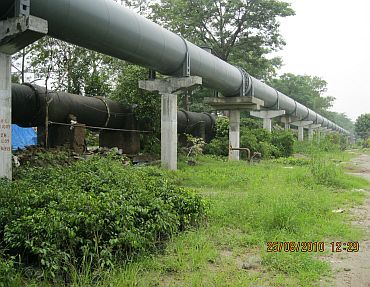
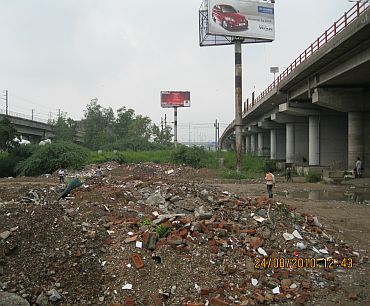
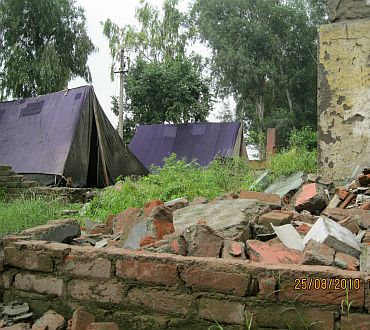
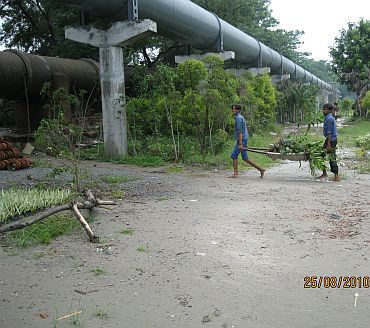
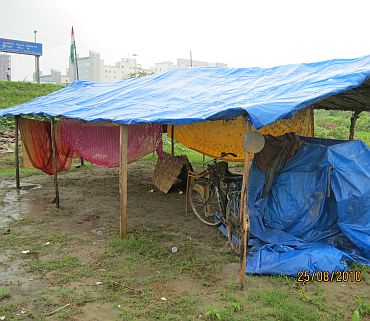
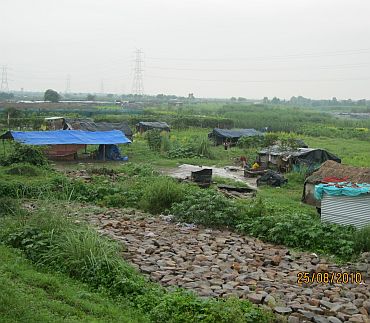
article